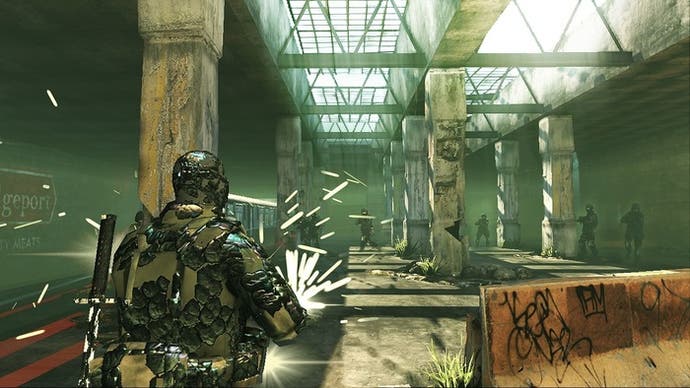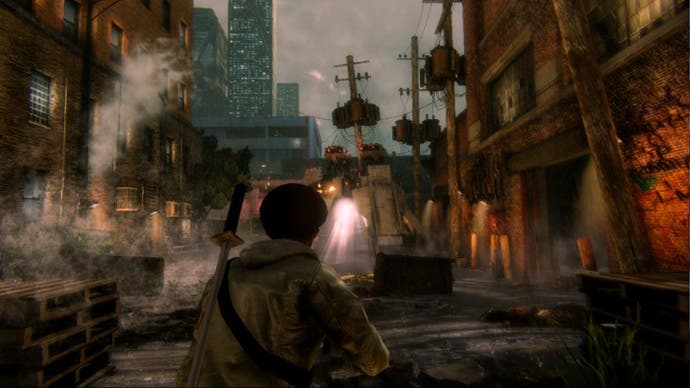"There is a plan": Project Awakened plots a post-Kickstarter course
The Kickstarter's over, but Phosphor Games' superhero adventure may continue.
What happens when a Kickstarter fails? In the case of Phosphor Games, the Chicago-based studio whose superhero action game Project Awakened stopped shy of its $500,000 target earlier this week, they get a call from me, asking a series of fairly insensitive questions. What went wrong? What did you learn? What's next?
Amazingly, the studio's willing to talk, on the condition that I don't reveal the name of the person I interviewed. Such cloak and dagger stuff is one symptom, perhaps, of the uncharted territory the team now finds itself in: if Kickstarter still feels like new ground, post-Kickstarter is surely a true wilderness.
What's it like running a Kickstarter campaign?
It was all-consuming. We spoke at DICE with people who had done Kickstarters, and we didn't even realise how much effort it was going to be until we got into it. We broke up the task amongst different people: YouTube, Kickstarter, Greenlight, someone else did Reddit, some other guys were cranking out content, it was almost like a presidential campaign in that we had one spokesperson, Chip Sineni, and then we had the whole team behind him working on different pieces of it.
Is this the future of making games? You'll be building the game itself, but also constantly electioneering?
I think it is what one way of getting things done is going to be, and that's great. Like the music industry did ten or so years ago we're going through a phase where there will always be large triple-A studio-backed multi-million dollar projects that dominate console, but there's a whole world of other options that are opening up. That makes the ecosystem more healthy, and that's great. There's so many ways to access all these other entertainment mediums, and gaming's just getting to that place. Obviously InXile kicks it hard when they make a Kickstarter. For them it seems to be a very functional model, and I think some people are going to build the rest of their careers on it this way. Great.
Looking at the success of InXile and some other video game Kickstarters, what do you think you could have done differently?
A lot of it evolved as we went along and we look back on it now, and in some ways you can see the things that weren't working and in another way you just have to listen to what people are saying. One of the things we've learned is that even people who liked it weren't sure quite what they were looking at, and the people who really weren't sure? It made them hesitant to pledge. I could be cavalier about it and say, "Oh, how could you have described Minecraft before you saw Minecraft?" That's the dismissive way to look at it. The other way is to admit that we could have done and could continue to do a better job of communicating what the whole vision is, because it's a very novel idea. A lot of people say, "This create-your-own-hero stuff sounds great, but is it a tech demo? I like story, I like characters." That stuff is going to be there too, but it's a lot harder to show in a hit reel than cool tech, special effects, and create-a-player. It's a lot harder to convey that you have a story. What we had to rely on was, "Hey, look at Horn and Dark Meadow, these games have critically-acclaimed story writing.Trust us that this is going to happen," but that doesn't roll with everyone.
We came at this with a completely cold start. We don't have any of the factors that other studios have had that have had big hits on Kickstarter. We don't have an existing brand, we aren't a spiritual sequel or a literal sequel, we don't have a big designer name from the '90s or the '00s that bring huge fanbases the second they open their mouth. We also don't have a lineage as a PC developer as a studio. All these developers back in the Midway days put out PC games and we have a big mobile lineage, but we don't have a PC lineage so it's hard to draw an existing fanbase from there.
So from the start, it was a cold start. By the end, though, we had a lot of people on all the platforms we were observing saying, "I just saw this yesterday." There are all these people who have not seen the game yet, and the Kickstarter's about to end. That sentiment, true or not, was one of our motivators to figure out what to do next - because if it is true, trying to maintain the visibility of the title and to try something new and even go for extra funding might be that extra life we were told was needed.
Is there a plan for what happens now?
There is a plan. To be perfectly honest, things are a little up in the air, but we started thinking along these lines towards the end of the campaign: what could we try and do differently if this doesn't work out? What we kept coming back to was the whole vision of Awakened over the past seven years has grown more into: we want to create a conversation with the players. We're making this together, and we want to give them power over where it goes. We thought, you know, this is an extension of that. It may work, it may not. We know we're not going to stop making the game, we know that without funding we can't afford to put a team on it yet. All these people on Kickstarter have said, "If I had PayPal I could help, I could tell more people if the campaign went longer."
We thought: let's test that. Let's put the power into the peoples' hands. Just like we want to let the modders take control of the game, and we want to let the players take control of the game, let's let them have power even earlier than we planned. Let's let them have power now. We're going to do a survey on our website and ask people: you've all said that you want us to keep going - but we can only get a minimum amount of money to do that or we feel that we're taking people's money and can't fulfil on a decent promise. So we're going to trust you that you're going to be honest with us, if you say you want us to continue with fundraising, about how much you're willing to pledge. Are you going to come over with the same amount you pledged at Kickstarter? If all those people come over then we'll keep going. We'd have $325,000, $350,000, and we can make a prototype with that - let's go forward. If more people show up, then we'll give that a try, too. We're trusting that if we ask enough people and we say that we'll make real decisions based on what they say in our survey, that we'll get an honest response from the masses.

And after the survey, you'll be raising money directly?
Yes. We'll do the survey for a week, and we'll say to everyone who can hear us, come tell us if you're willing to pledge. If enough of you say you will, we'll open up for a six week campaign on our own website so we can take PayPal and credit cards and not have to deal with anyone in the middle other than our credit card processor. Based on how much you've raised, we'll figure out how much we can do over the next year, year and a half.
In return for getting people's money directly - with none of Kickstarter's mediation - does the proposition you're offering have to change too?
As much as it's a very different game, we've looked at Minecraft as a great model for where we think a big piece of gaming can go. The end users are capable enough, the tools are capable enough, the core is savvy enough that you can put tools in their hands and get great content. Minecraft's an example of that: you don't have to give someone a perfectly polished product for them to see the promise of it, so long as there's a core of coolness in there. Notch opened an alpha and sold tickets to it. We're not going to be doing what we did in Kickstarter and saying that if you can raise half a million we'll get you to a closed beta at the end of next year. We're saying we'll take less than that and we'll get you to a prototype by the end of this year. You'll get something cool to mess around with sooner. We'll get your feedback sooner. If we can pull it off we'll make that prototype moddable too. You'll be able to influence the game even sooner than we thought back on Kickstarter.
With such a grand game vision, is there inevitably a moment where you will have to go for more traditional funding too?
It's possible, and that depends on where we want to take it and where the community wants to take it. We think that between the money we can raise ourselves and some help, hopefully, from the community, we can put a game up that has some compelling singleplayer and hopefully some multiplayer that goes beyond what people can do themselves. And modding, and a great create-a-player toolset. That's a great product, and we can grow it from there. If we want to do the big set-piece moments, we'll have to wait until we have more money, and we'll go to someone who wants to get involved.

When a Kickstarter doesn't succeed, does it make it harder to secure that more extensive kind of funding - the sort of thing that might traditionally have come from a publisher?
This is a brave new world for all of us - including our fanbase, we hope. I don't think we quite know yet what the end result is. Kickstarter started out as sort of a curiosity. Then it reached a point that enough of us were doing it, and now it's reached a point where enough of us are doing it that some of us are failing to. No-one knows what life after Kickstarter looks like yet. I haven't seen a larger-budget product fail and then talk about what happens.
The next phase in this style of funding and game creation is happening now. I haven't sat down with a publisher yet and said, "This game in a month went from zero to $330,000 interest and had 6000 people, 400,000 hits across YouTube, and we think that shows the nucleus of an audience there." Maybe they'd respond to that. Maybe they'd say, "Well, you didn't pull in two million, it's not Star Citizen, so it's not worth us backing." I have no idea. We'll find out. We're glad we did this. We didn't hit the goal, but there are some rabid fans out there now, who are like, "Find a way to ask me for money and I'll give it to you."











